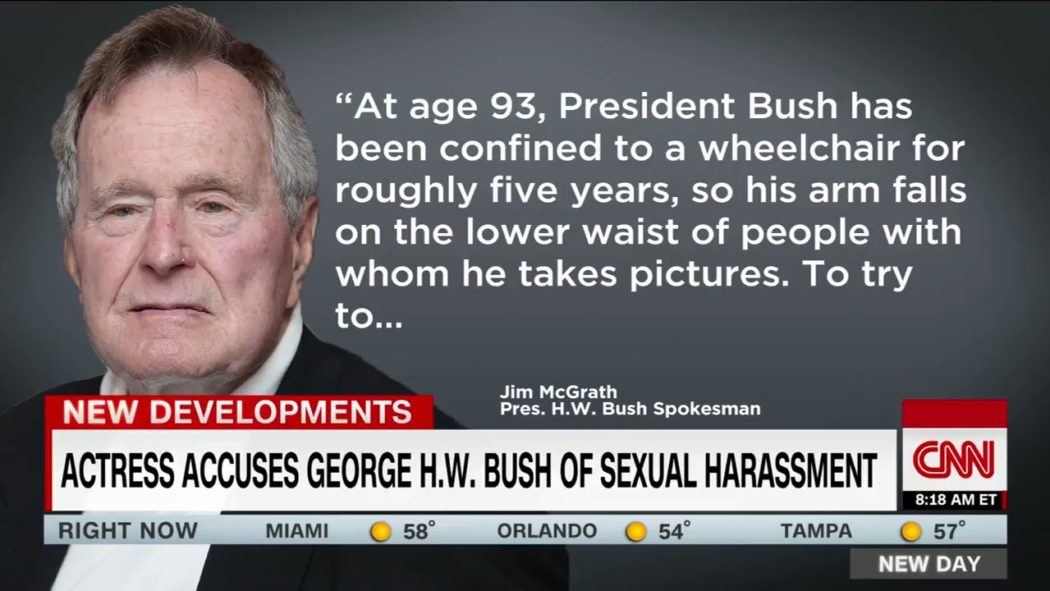It’s an exciting time for women’s voices. Long-silenced stories of sexual violation are rising up out of hiding and into the public discourse.
Fear of retaliation has become strength in numbers, as powerful perpetrators like Harvey Weinstein are brought to their knees, along with the system that enabled unchecked assault.
The secret shame of so many has become a source of empowerment for mass sharing and healing.
And then we have former President George H.W. Bush highlighting the concept of the “good-natured” grope.
Here’s the background: At least five women have come forward, accusing the 41st president of grabbing their behinds during photo ops, allegedly telling them his favorite magician is “David Cop-a-Feel,” and then squeezing hard just as the cameras clicked.
Bush’s spokesman explained that since the former president is confined to a wheelchair, his hand happens to fall at the waist of whoever is standing next to him.
“To try to put people at ease, the president routinely tells the same joke,” spokesman Jim McGrath said in a statement to multiple media outlets. “And on occasion, he has patted women’s rears in what he intended to be a good-natured manner. Some have seen it as innocent; others clearly view it as inappropriate. To anyone he has offended, President Bush apologizes most sincerely.”
And there you have it. No expression of remorse or wrongdoing, just the good-natured grope, explained in the context of a non-apology that if you can’t take a joke, the former president is sorry you are offended.
We’re better than this. We’ve come too far in the past few weeks to imply sexual assault victims are too sensitive if they don’t laugh it off when their butts are grabbed by men who minimize the offensiveness of their actions.
I get it. This type of blame-shifting is so common that a lot of people will read this and think I should lighten up. And that’s the point. We have a moment here to move forward and talk about this longstanding yet demeaning mindset with a civility and a respect that hasn’t existed before now.
George H.W. Bush certainly didn’t create the culture that excuses the good-natured grope. But rather than perpetuating it, he and his handlers can choose to take this opportunity to step up and help change it.
“Getting fondled without consent is never an appropriate joke,” says Sherry Hamby, Ph.D., a research professor at University of the South and editor of Psychology of Violence. Hamby says excusing this type of harassment is a form of victim-blaming that heaps more humiliation on an already traumatic situation.
Regardless of the perpetrator’s intent, Hamby says, “that kind of twisting of the true nature of the event is another betrayal, and every betrayal adds to the burden of victimization.”
We have an opportunity to lift this burden of shame, rather than pile another obstacle in the way of someone who summons the courage to finally speak out.
Whether it’s a lewd comment or an unwelcome touch, the jest defense is not only disrespectful, but far more damaging than it might seem.
“Because a sense of humor is such a valuable personal attribute, ‘she/he just can’t take a joke’ has the potential to be extremely powerful social ammunition, and to contribute to making sexual harassment insidious,” says Dr. Laura Niemi, Ph.D., a social psychology professor and researcher at Duke University.
Criticizing the victim for being humorless can also shame society back into silence.
Experts say this form of blame-shifting encourages all of us to make excuses for the perpetrator, contributing to a culture where victims feel disempowered and afraid to stand up for themselves.
It’s the same social script that gave us “boys will be boys” and “locker room talk,” which many people used to defend President Trump when he bragged about pussy grabbing in that video from 2005. In a statement issued after the video’s release, Trump himself minimized the impact and shifted blame, calling his words “foolish” and the nation’s focus on them “a distraction from the issues.”
According to Wendy Patrick, Ph.D., a longtime sex crimes prosecutor and ethics professor, “Giving offenders the benefit of the doubt (‘Oh, that’s just Fred’) empowers offenders and discourages victims from coming forward – which permits harassment to continue.”
So, let’s stop giving permission. Let’s stop focusing on intent, and start focusing on effect.
Rather than making excuses for offensive behavior, let’s show some sensitivity, own the behavior and take responsibility for the consequences.
Rather than continuing to shame victims into silence, let’s make sure the fallacy of the good-natured grope has a hand in finally giving this and future generations their voice.

